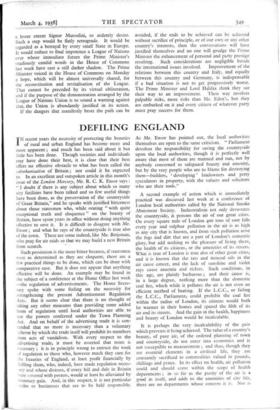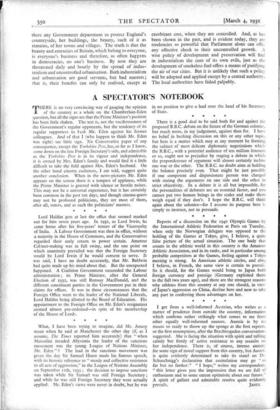DEFILING ENGLAND
IN recent years the necessity of protecting the beauties of rural and urban England has become more and more apparent ; and much has been said about it but little has been done. Though societies and individuals may have done their best, it is clear that their best offers no effective obstacle to what has been called the suburbanisation of Britain ; nor could it be expected to. In an excellent and outspoken article in this month's issue of the London Mercury, Mr. R. C. K. Ensor says : " I doubt if there is any subject about which so many airy futilities have been talked and so few useful things have been done, as the preservation of the countryside of Great Britain," and he speaks with justified bitterness about those statesmen who, while orating " with quite exceptional truth and eloquence " on the beauty of Britain, have spent years in office without doing anything effective to save it. It is difficult to disagree with Mr. Ensor ; and what he says of the countryside is true also of the town. There are some indeed, like Mr. Betjeman, who pray for air raids so that we may build a new Britain from scratch.
Such pessimism is the more bitter because, if statesmen were as determined as they are eloquent, there are a few practical things to be done, which can be done with comparative ease. But it does not appear that anything effective will be done. An example may be found in the subject of a conference at the Home Office last week —the regulation of advertisements. The Home Secre- tary spoke with some feeling on the necessity for strengthening the present Advertisement Regulation Acts. But it seems clear that there is no thought of taking any other measures than providing some added form of regulation until local authorities are able to use the powers conferred under the Town Planning Act. And on behalf of the advertising trade it is con- tended that no more is necessary than a voluntary scheme by which the trade itself will prohibit its members from acts of vandalism. With every respect to the advertising trade, it must be asserted that more is necessary ; it is in principle wrong to entrust the work of regulation to those who, however much they care for the beauties of England, at least profit financially by defiling them, who, indeed, have made regulation neces- -ary and whose distress, if every hill and dale in Britain were covered with posters, would at least be alleviated by monetary gain. And, in this respect, it is not particular rades or businesses that are to be held responsible. As Mr. Ensor has pointed out, the local authorities themselves are open to the same criticism. " Parliament devolves the responsibility for saving the countryside upon the local authorities, though it is perfectly well aware that most of them are manned and run, not by anybody concerned to safeguard beauty and amenity, but by the very people who are to blame for destroying them—builders, ' developing ' landowners and petty speculators in property, with the valuers and solicitors who are their tools."
A second example of action which is immediately practical was discussed last week at a conference of London local authorities called by the National Smoke Abatement Society. Industrialism not only devastates the countryside, it poisons the air of our great cities. On every square mile of London 40o tons of soot falls every year and sulphur pollution in the air is as high as any city that is known, and from such pollution arise the fogs and dirt that are a part of London's romantic glory, but add nothing to the pleasure of living there, the health of its citizens, or the amenities of its streets. What is true of London is true also of other great cities, and it is known that the tars and mineral oils in the air cause cancer, and the lack of sunshine and violet rays cause anaemia and rickets. Such conditions, in this age, are plainly barbarous ; and their cause is, in a large degree, nothing more than the domestic coal fire, which while it pollutes the air is not even an efficient method of heating. If the L.C.C., or failing the L.C.C., Parliamentf could prohibit the coal fire within the radius of London, its citizens would both be warmer in their homes and spared the filth of its air and its streets. And the gain in the health, happiness and beauty of London would be incalculable.
It is perhaps the very incalculability of the gain which prevents it being achieved. The value of a country's beauty, of pure air, of the ordered planning of town and countryside, do not enter into economics and is not susceptible to measurement ; and thus, though they are essential elements in a civilised life, they are constantly sacrificed to commodities valued in pounds, shillings and pence. In its effect on health, air pollution could and should come within the scope of health departments ; in so far as the purity of the air is a good in itself, and adds to the amenities of city life, there are no departments whose concern it is. Nor is there any Government department to protect England's countryside, her buildings, the beauty, such of it as remains, of her towns and villages. The truth is that the beauty and amenities of Britain, which belong to everyone, is everyone's business and therefore, as often happens in democracies, no one's business. By now they are threatened daily and hourly by the spread of indus- trialism and uncontrolled urbanisation. Both industrialism and urbanisation are good servants, but bad masters; that is, their benefits can only be realised, except at exorbitant cost, when they are controlled. And, as has been shown in the past, and is evident today, they are tendencies so powerful that Parliament alone can offer any effective check to their uncontrolled growth. A wise policy of development and preservation will find in industrialism the cure of its own evils, just as the development of smokeless fuel offers a means of purifying the air of our cities. But it is unlikely that such a policy will be adopted and applied except by a central authority. The local authorities have failed palpably.







































































 Previous page
Previous page